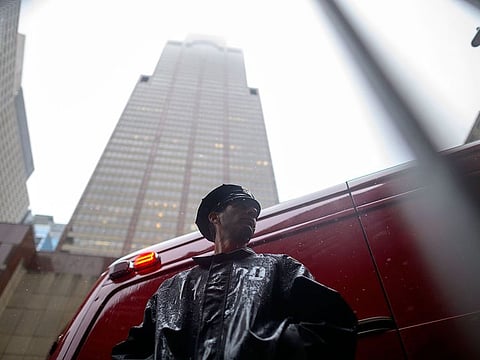New York chopper crash under scanner
Mayor Bill de Blasio said pilot would have needed approval from air traffic controllers

New York: The deadly rooftop crash-landing of a helicopter in the heart of New York City in rain and fog on Monday raised immediate questions about whether the pilot, the lone fatality, violated rules governing midtown Manhattan’s tightly restricted airspace.
Mayor Bill de Blasio said the pilot, whose helicopter crashed on top of a 54-storey office tower on Seventh Avenue and burst into flames, would have needed approval from air traffic controllers at nearby LaGuardia Airport to fly in that vicinity.
The privately-owned aircraft for executive charter flights went down about 11 minutes after taking off from a heliport on East 34th Street, apparently en route to its home base in New Jersey, city Police Commissioner James O’Neill said.
Asked by reporters why the pilot was out flying through midtown Manhattan in the rain and low visibility, O’Neill said, “We’re not sure. That’s part of the investigation.” De Blasio said authorities were seeking to determine whether the pilot made contact with LaGuardia’s tower or other air traffic controllers before the crash.
The Federal Aviation Administration (FAA) said in a statement that controllers “did not handle” the flight, but it remained unclear whether there was any communication at all between the helicopter and air traffic authorities.
Under federal flight rules for New York City, a helicopter pilot departing from that location would normally call LaGuardia, across the East River in the borough of Queens, to inform controllers it was taking off, though it is not strictly required to do so.
The rules allow a chopper following the East River to operate free of air traffic control by staying below an altitude of 1,100 feet (335 metres). If the helicopter climbs above that height, then LaGuardia tower is supposed to assume control of the flight, according to the rules.
FAA spokesman Kathleen Bergen declined to say whether the helicopter that crashed was flying below 1,100 and whether it was following the East River corridor, or whether additional restrictions might apply in low visibility, saying those issues remained under investigation.
The crash investigation is to be led by the National Transportation Safety Board.
The crash site is about half a mile from Trump Tower, where United States President Donald Trump maintains an apartment, an area that has been under extra-tight flight restrictions since Trump’s November 2016 election.
De Blasio stressed no evidence pointed to an act of terror or criminal intent.
There is no landing pad on the building, the mayor said.
Helipads have generally been banned from Manhattan rooftops under rules imposed following a fatal 1977 helicopter crash at an office tower then known as the Pan Am building.
In 2016, bowing to complaints about noise and air pollution, the city reached a deal with Manhattan’s helicopter sightseeing tour operators to cut the number of their flights by half.
According to the New York Times, those flights numbered more than 59,000 in 2015, all of them departing from Pier 6 near the Battery at the southern tip of Manhattan — the only heliport providing the tours.



